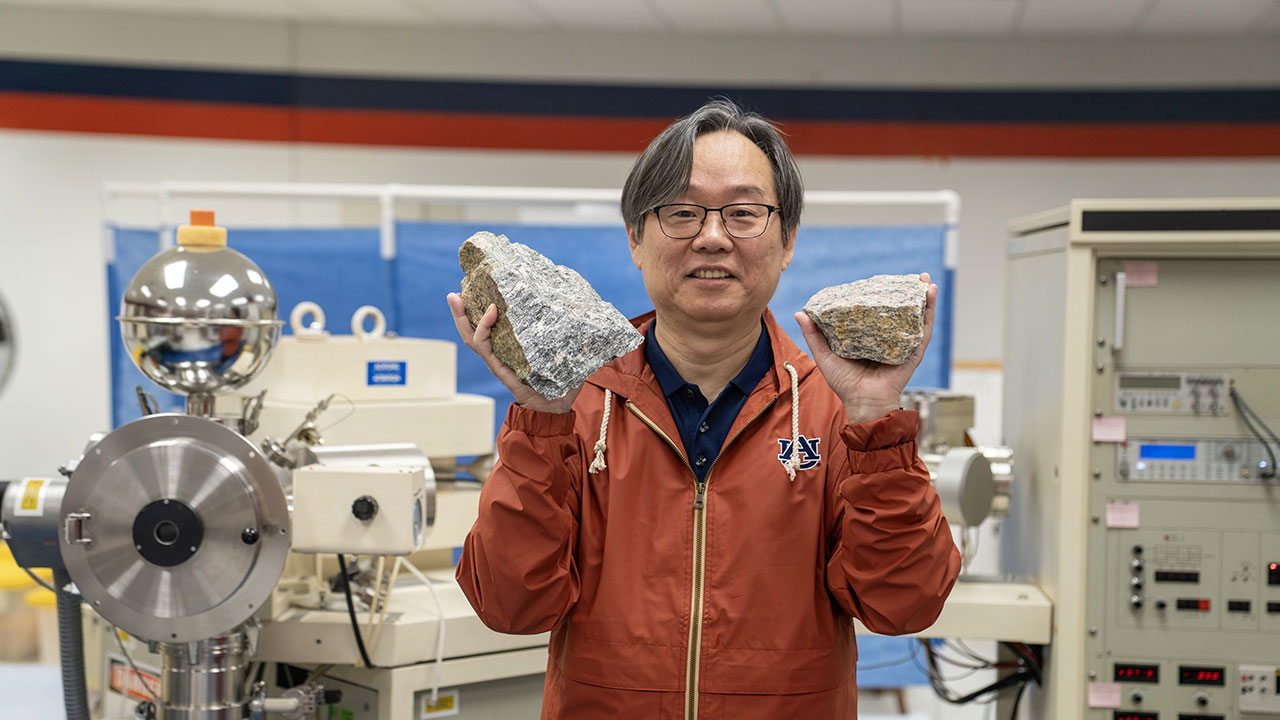content body
Haibo Zou’s curiosity nearly killed him as a child.
While just a toddler in his native China, Zou almost drowned after a mystery of nature beckoned him into a neighborhood pond.
“I saw a fish swimming, and I jumped in with it, but people saved me,” Zou said. “I asked my mom, ‘A little fish can swim, but why can’t I?’ So, that was all about curiosity and logic. I don’t take those kinds of risks anymore, but curiosity is always a good thing.”
While not as impulsively adventurous as he once was in his youth, Zou is still driven by a healthy amount of curiosity. It led him to two geology degrees at Nanjing University in his homeland, as well as a doctorate in the field from Florida State University. An Auburn University faculty member since 2008, Zou’s inquisitive nature has helped him establish a respected reputation as a scholar and, most recently, the lofty title of American Association for the Advancement of Science (AAAS) Fellow.
Zou was named one of 471 scientists, engineers and innovators to the AAAS’ 2024 class of fellows from 24 disciplines, joining College of Sciences and Mathematics colleague Overtoun Jenda as the only scholars from the state of Alabama on the prestigious list.
AAAS — one of the world’s largest scientific societies and publisher of the “Science” family of journals — cited Zou’s work in geology and geography, specifically noting his “contributions in quantitative computational geochemical modelling, particularly with trace elements” as a factor separating him from other scholars.
“When I saw the full list, I was really happy to be a new Fellow this year,” said Zou, who serves as associate chair of the Department of Geosciences. “Some people know mathematics really well, and some people know geology really well, but if you are able to do both, you can excel. I was surprised about the citation, especially the mathematical part of the work, and I really appreciate that they valued that.”
Versatility personified
Zou admits the early part of his career was focused more on theoretical pursuits, and he shifted his efforts toward fundamental implementations out of necessity.
“My original reputation came from mathematical modeling of geological processes, but I realized that just doing the modeling, it’s hard to get funding, especially in geology,” he said. “So, I also established a reputation in experimental geology through the laboratory analysis.”
Zou has mastered the use of a high-precision mass spectrometer, which has led to breakthroughs in isotope and trace element geochemistry. Combine that with his deep mathematical knowledge and experience, and Zou is a versatile researcher who can tackle any number of projects in his ISOLAB in Beard-Eaves-Memorial Coliseum.
Hired as a petrologist — someone who studies rocks — Zou describes his research as “broad” since he mixes equipment and instrumentation expertise with an ability to decipher problems to solve and effective ways to date rocks as old as 4 billion years. By applying mathematics to geology, Zou is able to expand his research’s reach and potential, virtually extending the possibilities of his work for countless years.
“Once you can quantify a process using equations to describe processes, science lasts really long,” he said. “I learned one thing from Einstein — politics is for the moment; equations are for eternity. That’s why I like mass spectrometers and mathematics. Those tools can be applied to almost anything.”
Solving real-world problems
In recent years, Zou shifted his research focus yet again, taking on projects designed to tackle real-world problems like the spread of pollution. Finding tangible applications for the data and discoveries he and his team produce in the lab has helped Zou make an impact in the applied aspect of science.
For instance, he can analyze contaminated water to track where the contaminants originated, identifying a “fingerprint” of the polluting elements.
“Their fingerprints are hard to detect because that’s in the isotope ratios, and the difference is really tiny,” Zou said. “So, you need to have high-precision equipment to figure it out. This machine can measure the isotopes such as lead, strontium and osmium really well, and we can figure out where the contamination came from.”
Zou has ongoing projects in north Alabama, Arkansas and New Mexico and is lending his expertise to projects analyzing everything from dark petroleum, volcanos and groundwater to fish bones and dinosaur teeth. Fueled by endless curiosity, Zou eyes the future with ambition to continue making an impact on the world through science.
“Curiosity is also kind of a puzzle, and when we do any science, there are always unsolved problems,” said Zou, who has researched sea floor rocks in the past. “So, curiosity and the desire to solve problems is what keeps you going. That can drive your interest for a long, long time.
“It’s still curiosity-driven, but you also think about impact and outreach. I have quite a lot to contribute in the future to the field and to this university.”












